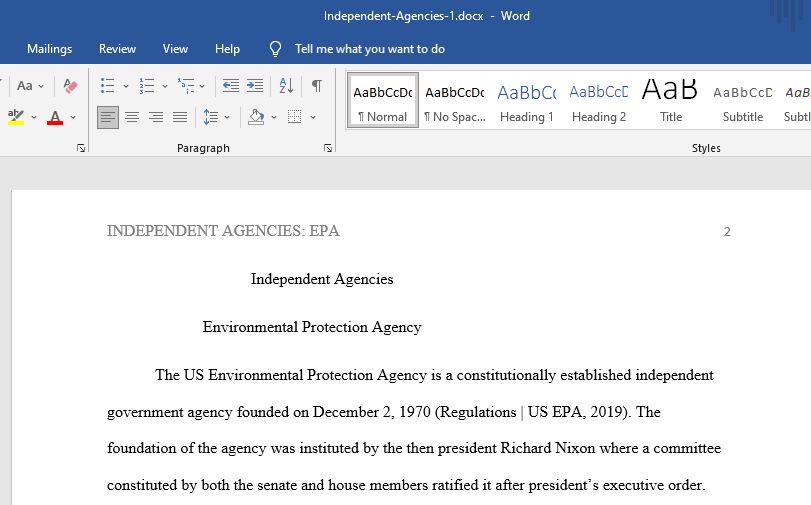Independent Agencies: Environmental Protection Agency
As you are probably at least somewhat familiar with some of the federal departments (Agriculture, Commerce, Defense, Education, Energy, Health and Human Services, Homeland Security, Housing and Urban Development, Interior, Justice, Labor, State, Transportation, Treasury and Veterans Affairs), select one of the other independent administrative agencies (i.e., those that do not come under a Department) from this list:
FEDERAL DEPARTMENTS (C-I)
Chemical Safety and Hazard Investigation Board
Commodity Futures Trading Commission
Consumer Financial Protection Agency
Consumer Product Safety Commission
Defense Nuclear Facilities Safety Board
Environmental Protection Agency
Federal Communications Commission
Federal Deposit Insurance Corporation
Federal Election Commission
Federal Emergency Management Agency
Federal Labor Relations Authority
Federal Reserve Board
Federal Trade Commission
General Services Administration
International Trade Commission
FEDERAL DEPARTMENTS (M-U)
Merit Systems Protection Board
National Aviation and Space Administration
National Credit Union Administration
National Endowment for the Arts
National Endowment for the Humanities
National Labor Relations board
National Mediation Board
National Science Foundation
National Technology Transfer Center
National Transportation Safety Board
Nuclear Regulatory Commission
Peace Corps
Pension Benefit Guaranty Corporation
Securities and Exchange Commission
Selective Service System
Small Business Administration
Smithsonian Institute
United States Postal Service
Once you have selected one, respond to these questions regarding the independent agency.
- What is its function (i.e., with which specific delegated power(s) did Congress imbue this agency)? (For example, for the Federal Aviation Administration, it is to “encourage the development of civil aeronautics and safety of air commerce in and outside the United States.”)
- Specifically where in the United States Code (U.S.C.) does one find this delegation (i.e. what is the title and section with that language)? (NOTE: for the Federal Aviation Administration it would be 49 U.S.C. § 40104(a).)
- Who is charged with this delegation (e.g., is it a board, a commission, an administrator, etc.)? (NOTE: For example, for the Federal Aviation Administration, it would be the “Administrator.”)
- How is the agency to fulfill its tasking (e.g., licensing, certifications, etc.)? What power does it have for compliance (e.g., civil fines, criminal actions, etc.)?
- What individual(s) currently hold(s) the position(s)? (NOTE: For example, at the time of development the then-current Acting Administrator of the Federal Aviation Administration was Dan Elwell.)
- Do you think Congress should alter its grant of delegated authority to this agency (e.g., grant additional power(s), restrict power(s), or even abolish the agency), and, if so, in what manner(s), and why (i.e., explanation)/rationale)
Answer preview:
Words:1300

